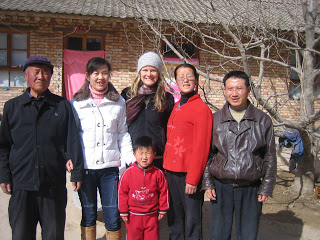It has been five years since returning from China and I still haven’t figured out how to live, much less thrive, in my own culture. I have struggled to feign interest when the culture, food, language and people just aren’t as colorful or fascinating. I am often convicted of feeling superior or judging others and I still haven’t reached a stride in building new relationships (could be the judging, perhaps?).
In college, I took a course where we had to do an ethnography on a people group in the suburbs of Chicago in preparation for going overseas to live for six months in a developing country. An ethnography is a way of systematically studying people and cultures while trying to observe from the subject’s point of view.
The first rule of the study?
Observe. Just observe and take notes.
I studied the third graders in the classroom I was aiding in at the time, but some classmates did a few more memorable studies on a Metra train and in a laundry mat outside of Chicago.
A laundry mat. Three months of watching to see what kind of people did their laundry, how much laundry they did, what they talked about, what they did while they waited, how often they came and where they sat…
Sounds boring, but it was actually remarkable what behavior patterns and social norms we discovered by simply observing. I used the experience when I lived in Uganda for six months, in Tajikistan for five weeks and later in China for five years and felt like it helped me to enter a new culture as a learner.
But after returning from China five years ago and assuming I understood my own “boring” culture, I’ve been wondering if I should pull out this tool again. What would I observe if I were more intentional about noticing people in my seemingly homogeneous life? What if I started really paying attention when I go to the following places:
The grocery store
The playground
My son’s preschool
Church
A local coffee shop or bookstore
What would I learn? What would I see? What would surprise me?
The second rule of the ethnography, which we weren’t supposed to do until we went abroad was: Ask questions and seek to understand. We were not to make suggestions for how to improve a situation or even help until we felt we had taken the time to understand before passing judgment.
Do I do this now? Do I ask questions for the purpose of really trying to understand the people around me? Or do I assume too much about them based on how they look?
In China, one of my main goals in being there was to develop relationships with Chinese people. My “manual” for doing that, were I to teach a new person entering China would be something along the lines of this:
Cross-cultural Relationship Building 101
1. Study and learn the language–get a tutor as soon and as frequently as you can.
2. Visit the same shops and visitors to chat with people.
3. Practice hospitality by intentionally having people over to your home and accept invitations to other’s homes.
4. Be an learner first–ask questions.
5. Ask for help and find a local cultural informant.
6. Actively look for ways to serve and bless others.
7. Pray for the people you meet because it is most likely not a coincidence that you are brushing shoulders with them right now.
These guidelines worked very well cross-culturally, but what about here? I firmly believe that you will be the same person after going abroad that you were before you left. But is the reverse true? Am I the same now as I was in China?
Five months ago, my family and I moved from edgy, diverse Chicago to probably the most boring mission field there is: a neighborhood of all white retired people in Loveland, Colorado. My husband and I have been convicted by how snobby we are (What! No pour-over, locally roasted, bird friendly, organic, shade grown coffee!!!???). I am also slightly guilty of reverse racism. It’s hard to believe, but what if God really does love my white pick-up truck driving neighbors as much as the Chinese students in my classroom or the child in the slums of Kampala? And what if I applied Relationship Building 101 here? Would it work?
I’m writing this here now mainly to keep myself accountable to follow through with my own personal challenge to live the SAME wherever I am and to use my “tools” to love the people in my village. My Chinese sister in Christ would call them my “pang bian de ren”–the people next to me. Please help me in praying:
Lord Jesus, show me more than what is on the surface. Show me people’s hearts. Teach me to love the people you have put all around me–wherever I am. Forgive me for being so judgmental and for making assumptions. Help me to not just survive where I am living, but thrive.
In review,
Step one: Observe
Step two: Ask questions
Step three: Build Relationships
I’ll be checking in later to report on how my family is doing! We’ve been observing and asking questions, now on to the relationship building.
Have you ever returned from the field and felt a similar disdain for your passport culture? What kind of tools do you use to engage with your culture–whether that’s in your passport country or abroad?
(This is a practical companion to Longing for Home)
Follow me on Twitter and Facebook
This post is day 14 of the series “Re-entry: Reflections on Reverse Culture Shock,” a challenge I have taken to write for 31 days. Check out my other posts in the series:
Day 1: Introduction
Day 2: Grieving
Day 3: No One Is Special
Day 4: Wasted Gifts
Day 5: I Never Expected…
Day 6: Identity: Through the Looking Glass
Day 7: Did I mishear God?
Day 8: When You Feel Like Shutting Down
Day 9: Caring for your Dorothy
Day 10: You’re Not the Only One Who’s Changed
Day 11: 12 Race Day Lessons for Serving Overseas
Day 12: Confessions of an Experience Junkie
Day 13: Longing for Home
Day 14: Readjusting: Same Tools, Different Work Space
Day 15: Book Review: The Art of Coming Home
Day 16: The Story of My “Call”
Day 17: Is Missions a “Higher Calling”?
Day 18: And Then I Fell in Love
Day 19: Is God Calling You Overseas?
Day 20: Life Is Not Seasonal
Day 21: What I Took and What I Left Behind
Day 22: Groundless, Weightless, Homeless
Day 23: When the Nations Come to You
Day 24: The Call to Displacement
Day 25: Scripture Anchors for Re-Entry
Day 26: In the Place of Your Exile
Day 27: Resources for Re-entry
Day 28: A Time for Everything: A Prayer of Leaving
Day 29: Journal: 8 Months After Re-Entry
Day 30: 12 Survival Tips for Re-Entry
Day 31: A Blessing
(Day 32: Writing is Narcissistic (And Four Other Reasons Not to Write)–a reflection on this Write 31 Days experience)
Picture: “Handful of tools (1904 advertisement)” by Unknown – http://chroniclingamerica.loc.gov/lccn/sn88085187/1904-01-02/ed-1/seq-4/ (Tacoma Times). Licensed under Public Domain via Wikimedia Commons – https://commons.wikimedia.org/wiki/File:Handful_of_tools_(1904_advertisement).jpg#/media/File:Handful_of_tools_(1904_advertisement).jpg












